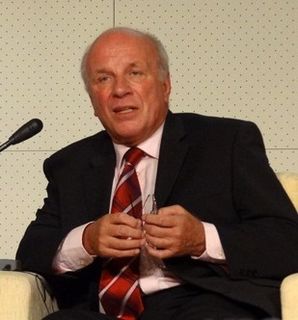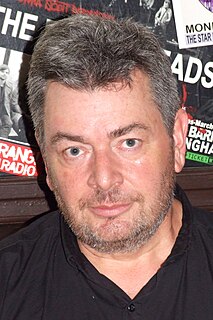
The Independent is a British online newspaper. It was established in 1986 as a national morning printed paper. Nicknamed the Indy, it began as a broadsheet and changed to tabloid format in 2003. The last printed edition was published on Saturday 26 March 2016, leaving only the online edition.
Page 3, or Page Three, was a British newspaper tradition of publishing a large image of a topless female glamour model on the third page of mainstream red-top tabloids. The Sun introduced Page 3 in 1970, which boosted its circulation considerably, leading to other tabloids imitating the feature on their own third pages.

Gregory Dyke is a British media executive, football administrator, journalist, and broadcaster. Since the 1960s, Dyke has had a long career in the UK in print and then broadcast journalism. He is credited with introducing 'tabloid' television to British broadcasting, and reviving the ratings of TV-am. In the 1990s, he held chief executive positions at LWT Group, Pearson Television, and Channel 5.
Sports journalism is a form of writing that reports on matters pertaining to sporting topics and competitions. Sports journalism started in the early 1800s when it was targeted to the social elite and transitioned into an integral part of the news business with newspapers having dedicated sports sections. The increased popularity of sports amongst the middle and lower class led to the more coverage of sports content in publications. The appetite for sports resulted in sports-only media such as Sports Illustrated and ESPN. There are many different forms of sports journalism, ranging from play-by-play and game recaps to analysis and investigative journalism on important developments in the sport. Technology and the internet age has massively changed the sports journalism space as it is struggling with the same problems that the broader category of print journalism is struggling with, mainly not being able to cover costs due to falling subscriptions. New forms of internet blogging and tweeting in the current millennium have pushed the boundaries of sports journalism.

World in Action was a British investigative current affairs programme made by Granada Television for ITV from 7 January 1963 until 7 December 1998. Its campaigning journalism frequently had a major impact on events of the day. Its production teams often took audacious risks, and the programme gained a solid reputation for its often unorthodox approach. The series was sold around the world and won numerous awards. In its heyday World in Action drew audiences of up to 23 million in Britain alone, equivalent to almost half the population.

David Morris Aaronovitch is an English journalist, television presenter and author. He is a regular columnist for The Times and the author of Paddling to Jerusalem: An Aquatic Tour of Our Small Country (2000), Voodoo Histories: the role of Conspiracy Theory in Modern History (2009) and Party Animals: My Family and Other Communists (2016). He won the Orwell Prize for political journalism in 2001, and the What the Papers Say "Columnist of the Year" award for 2003. He previously wrote for The Independent and The Guardian.
Journalistic ethics and standards comprise principles of ethics and good practice applicable to journalists. This subset of media ethics is known as journalism's professional "code of ethics" and the "canons of journalism". The basic codes and canons commonly appear in statements by professional journalism associations and individual print, broadcast, and online news organizations.
Roger Alton is an English journalist. He was formerly editor of The Independent and The Observer, and executive editor of The Times.
The News on Sunday was a left-wing British tabloid newspaper. It was launched in April 1987. Publication ceased seven months later, in November 1987.
The Department of Journalism at City, University of London, is a journalism school in London. It is regarded as one of the best universities in the United Kingdom for the study of journalism. as well as the nation's largest centre for journalism education. It was described by Michael Hann of The Guardian, along with Cardiff School of Journalism, Media and Cultural Studies, as the "Oxbridge of journalism".

The College Tribune is a student newspaper which serves Ireland's largest third level institution, University College Dublin. It was established in 1989 with the assistance of journalist and broadcaster Vincent Browne who was attending the university as an evening student at the time. Browne noted the campus' lack of a news outlet which was independent of both the university and University College Dublin Students' Union and alongside founding editor Eamon Dillon set up the Tribune to correct this. Initially, a close working relationship was maintained between the Tribune and the Sunday Tribune which was at the time edited by Browne. This relationship afforded the paper the use of professional production facilities in its fledgling years. Ultimately however, the student newspaper would long outlast its national weekly counterpart with the Sunday Tribune having ceased publication in 2011. The College Tribune is UCD's oldest surviving newspaper having been published continuously for over 30 years. The current editor of the 35th volume of the paper is Conor Paterson.

The Guardian is a British daily newspaper. It was founded in 1821 as The Manchester Guardian, and changed its name in 1959. Along with its sister papers The Observer and The Guardian Weekly, The Guardian is part of the Guardian Media Group, owned by the Scott Trust. The trust was created in 1936 to "secure the financial and editorial independence of The Guardian in perpetuity and to safeguard the journalistic freedom and liberal values of The Guardian free from commercial or political interference". The trust was converted into a limited company in 2008, with a constitution written so as to maintain for The Guardian the same protections as were built into the structure of the Scott Trust by its creators. Profits are reinvested in journalism rather than distributed to owners or shareholders.
Wendy Henry is a former British journalist and newspaper editor.

The Sun is a British tabloid newspaper. As a broadsheet, it was founded in 1964 as a successor to the Daily Herald, and became a tabloid in 1969 after it was purchased by its current owner. It is published by the News Group Newspapers division of News UK, itself a wholly owned subsidiary of Rupert Murdoch's News Corp. Since The Sun on Sunday was launched in February 2012, the paper has been a seven-day operation. The Sun previously had the largest circulation of any daily newspaper in the United Kingdom but it was overtaken by rival Metro in March 2018.
Damien McCrystal became the first City editor of The Sun, News International’s daily tabloid, in September 1987 after Robert Worcester, the founder of Market & Opinion Research International told Rupert Murdoch, the owner of News International, that the wave of utility company privatisations in the UK had turned one-quarter of The Sun’s readers into share-owners.
Daisy Louisa Dominica Waugh is an English novelist and journalist.
Paul Routledge is an English journalist. Routledge currently writes for the Daily Mirror, where he is a political correspondent, and is considered 'Old Labour' in his political outlook.
Big Flame was "a revolutionary socialist feminist organisation with a working-class orientation" in the United Kingdom. Founded in Liverpool in 1970, the group initially grew rapidly, with branches appearing in some other cities. Its publications emphasised that "a revolutionary party is necessary but Big Flame is not that party, nor is it the embryo of that party". The group was influenced by the Italian Lotta Continua group.
Peter Chippindale was a British newspaper journalist and author.

Coverage of the 1989 Hillsborough disaster by the British tabloid The Sun led to the newspaper's decline in Liverpool and the broader Merseyside region, with organised boycotts against it. The disaster occurred at a football match between Liverpool and Nottingham Forest. 97 Liverpool supporters were crushed to death, and several hundred others were injured, due to negligence by the South Yorkshire Police. On 19 April 1989, four days after the incident, The Sun published a front page story with the headline "The Truth" containing a number of falsehoods alleging that Liverpool supporters were responsible for the accident.







